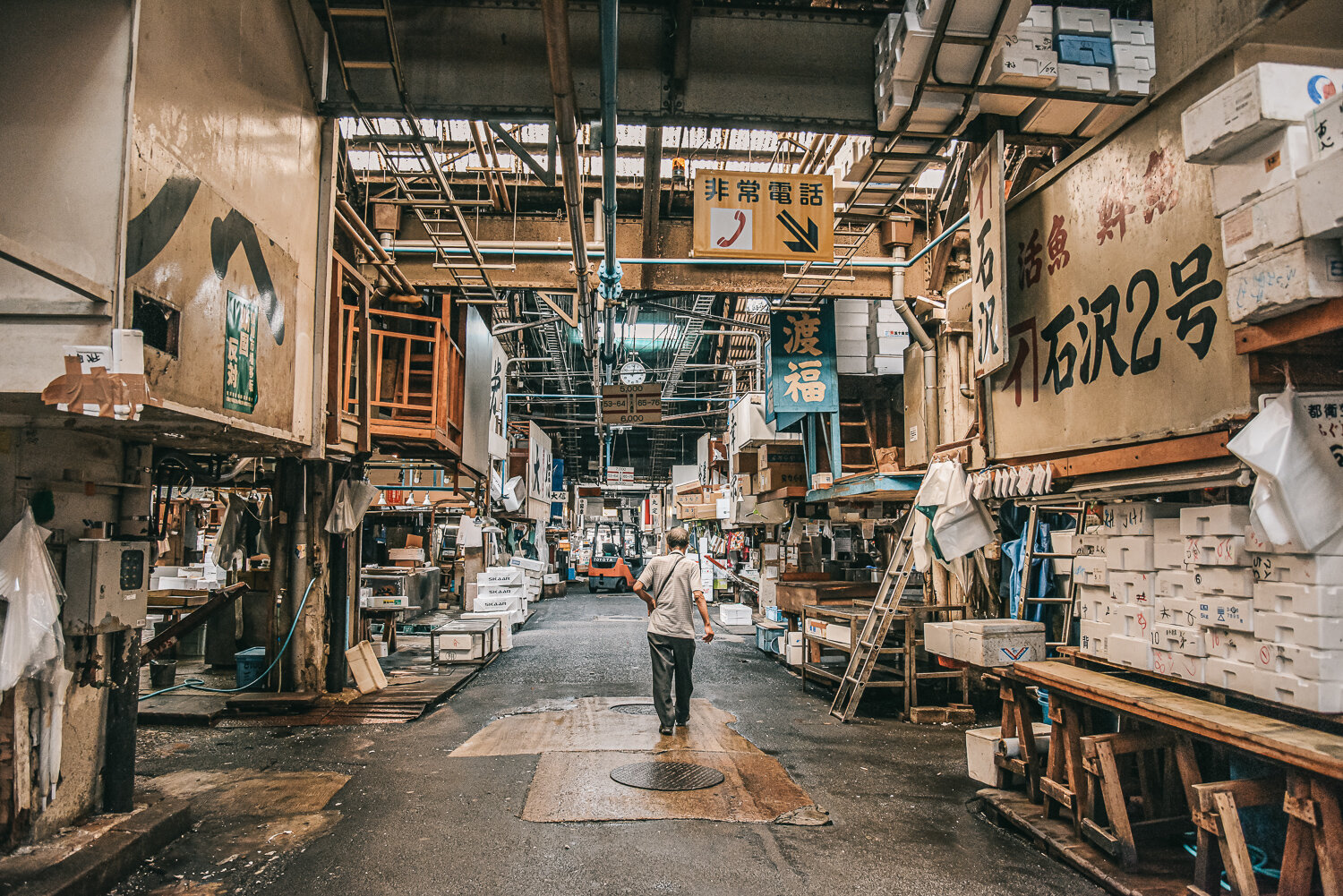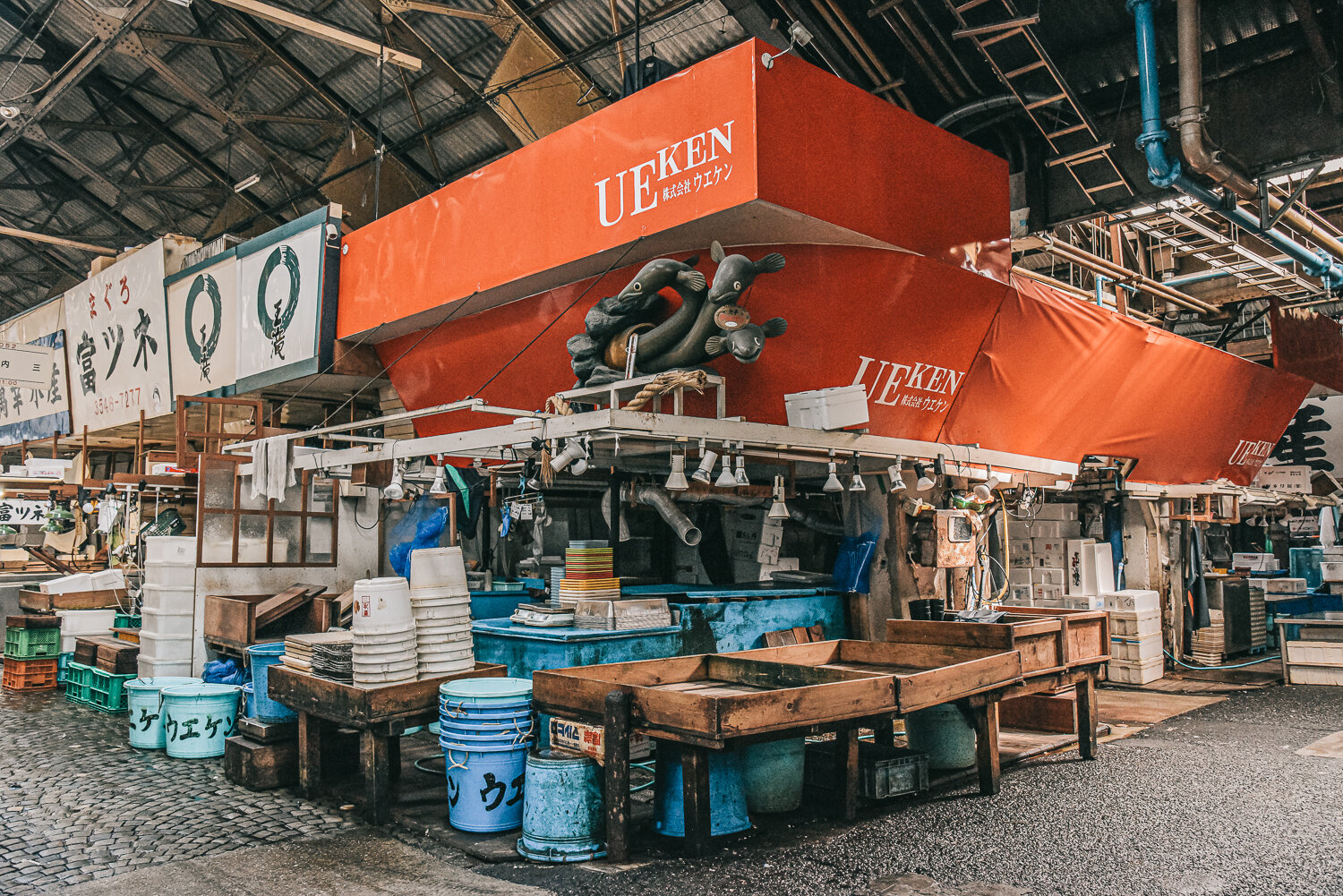Tokyo Diaries: Love Letter to Tsukiji Fish Market
On the 29th August 2017 at 5:50 AM, Tokyo mega-city woke up from its cyberpunk dream with sounds of shoes tapping on the metro steps. Up and down, they formed the rhythm of the workers’ life. The white-shirt-black-trousers corporate people rushed in the trains for their daily commute. Doors closed. Train wheels squeaked. The hymn of capitalism.
At the Tsukiji Fish Center, things looked and sounded quite different. At precisely the same time, the first tuna fish auction was about to begin. More than 500 professional fishermen were getting their coffee, smoking a cigarette and preparing mentally to jump into the bidding race for the fattest, reddest, biggest tuna. It’s a merciless 30 minute first come, first served race. All trade is done on pen and paper, by shouting and ringing bells. When the auction bell stops ringing, the fish bidding is over. Every part of the tuna is valued differently: back or belly; front, middle or tail – all has a different price. I spoke to one fisherman and he said the holy grail of a tuna fish is finding a dark red fat belly. Irresistibly sexy for sashimi connoisseurs.
The legendary tuna fish auction at the old Tsukiji Fish Market.
Everybody shops at Tsukiji: 3-star Michelin restaurants, sushi chains and private customers. The relationship between fishermen, salesmen and chefs is quite particular. Fishermen are, technically speaking, bitter competitors. Yet, you can feel this only in the two 30-minutes slots in the mornings when the tuna auction takes place. Otherwise, they hold high respect for each other’s work. Each fisherman is specialized in 1 to 4 types of fish on average. Some trade only with tuna. Others have a stand in the Inner Fish Market where they sell a few types of fish. Fishermen have a trust-based relationship with their chef clients. If a fish quality is not good enough for the chef’s clientele, it will never be sold for the sake of profit. High reputation means everything both for the fishermen and for the chef. Nothing is compromised for money. All is for the love of fish.
The fishermen told me 83 years ago, when the market was founded, the place used to be dull, boring and lifeless. All the charm and atmosphere were created generation by generation from the hard working hands of the fishermen. Every stand, every painted label, the neat and clean lanes – all come from these people who never grumble despite the crazy work hours, the heavy fish carried in motor cars and the competitiveness of the job.
Today, the Old Tsukiji Fish Market in Tokyo is permanently closed. It used to be an iconic Tokyo experience. The symphony of the rubber boots, the splashing water and the knifes chopping fish heads used to be loud and clear all over the market. I visited months before the market closed and in the background of this cacophony, I could hear the humming of a sad tuna tune. It was telling me the story that Tsukiji would be gone because Tokyo municipality decided to build part of the infrastructure for the 2020 Olympic Games precisely there. It’s the classic story of the people versus the institution. The story of financial profit over tradition and honor. The story of a heritage lost.
I have no idea what was going on in the meeting room that decided to close and move the Tsukiji market, but I am damn sure, sashimi will never taste as good. As I left the inner fish market, I glanced at the last big tuna fish. Its eyes were dead, its body stiff and cold, its mouth wide open. “Farewell” she whispered. I left Tsukiji and never looked back, but the smell of fish blood and the salty ocean haunts me till this day.
All pictures were taken in 2017 in the Tsukiji Inner Fish Market. This market is now permanently closed and moved to another location in Tokyo. Photos there were strictly prohibited. The fishermen were kind with me and let me in. I am very grateful for their generosity. This article and these photos are dedicated to them.
Copyright © Alex Kovacheva, Nomad Photos. All rights reserved.

































